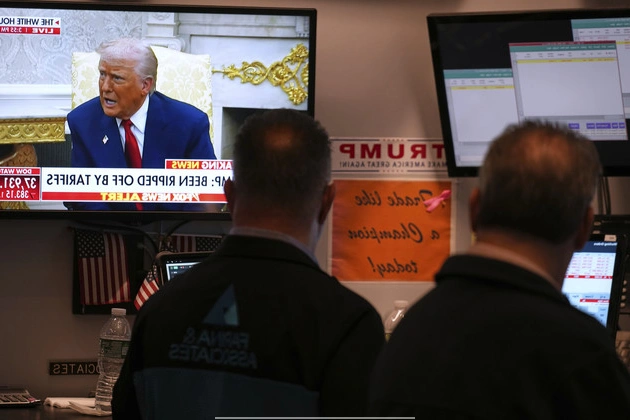
America’s dealmaker-in-chief is beginning to jam up business for his Wall Street counterparts.
President Donald Trump’s election was supposed to give rise to a bonanza of companies listing shares on U.S. stock exchanges, raising money and striking deals, in what would have been a welcome rush of activity for the financial world.
Yet, five months later, Trump’s sweeping trade war is freezing up the deal markets instead — and bankers say there is little chance of a thaw any time soon. The ticketing giant StubHub, financial technology firm Klarna and upstart trading platform eToro all recently hit pause on their plans to sell shares to the public. And executives are feeling uneasy about making investment decisions, portending what could be a protracted slowdown to corporate mergers and acquisitions.
Trade War Impacts
“People are absolutely paralyzed,” said West Riggs, head of equity capital markets at Truist Securities. “We’re going to have to see things calm down and calm down for some period of time. It’s weeks or months — not days.”
The deal markets’ struggles underscore how the Trump administration’s head-spinning moves on tariffs and the subsequent scramble to strike new trade deals have petrified C-suite executives.
Across corporate America, companies are trying to grasp what the levies could mean for their supply chains, investments and future earnings — to say nothing of the uncertainty over where things will stand after Trump’s 90-day pause on his “reciprocal” tariffs. And Wall Street leaders warn that the fallout in the markets will reach well beyond the financial world.
“This isn’t Wall Street versus Main Street,” BlackRock CEO Larry Fink said Friday. “The market downturn impacts millions of ordinary people’s retirement savings.”
JPMorgan Chase CEO Jamie Dimon — who caught Trump’s ear last week by warning about a potential recession — told reporters Friday that the pullback on dealmaking is “not just big ones, but middle-market companies,” too.
Riggs cautioned that if capital formation is frozen, so is business formation and growth.
Last week, Delta Air Lines pulled back on previously issued guidance as a result of the lack of clarity about tariffs. Walmart, the world’s biggest retailer, told investors that the range of outcomes for its operating income growth in the first quarter had widened. And Dimon said he is expecting more to follow in scratching their forecasts.
The administration has expressed little concern about what the tariffs mean for Wall Street — beyond the almighty bond market. Officials from Treasury Secretary Scott Bessent to press secretary Karoline Leavitt argue that Trump’s tariffs are about aiding “Main Street,” not Wall Street. The White House did not respond to requests for comment on this story.
“The president is determined to renegotiate global trade on behalf of American workers,” Leavitt said at a press briefing Friday.
The banks aren’t suffering yet. JPMorgan and Morgan Stanley reported blockbuster earnings for the first quarter Friday, largely driven by their trading desks. And despite the dour mood among bankers, both companies saw their investment banking businesses pick up.
But the markets remain volatile. The S&P 500 ended trading last week up 5.7 percent, but still down nearly 13 percent from its February high. U.S. government debt, meanwhile, has continued to sell off in recent days. The yield on 10-year Treasuries, which moves in the opposite direction of its price, nearly eclipsed 4.5 percent Friday while the 30-year Treasury yield was on the brink of 5 percent.
In the deals market, bankers and traders expected the Trump administration — and its plans for deregulation and tax cuts — to help revive activity in 2025.
Former President Joe Biden’s aggressive antitrust watchdogs were a continual thorn in the side of companies looking to buy one another and private equity firms. And the market for initial public offerings had been decimated in the aftermath of the 2022 market sell-off, which spooked many companies from going public over concerns about their valuations, Renaissance Capital senior strategist Matthew Kennedy said.
But the tariff uncertainty and the resulting chaos that have hit stock prices are forcing companies to recalibrate their plans yet again.
“Nothing shuts down the IPO market faster than a spike in volatility,” Kennedy said.
The Cboe Volatility Index, which is known as Wall Street’s fear gauge, recently hit its highest level since the outset of the COVID-19 pandemic.
Still, there is a strong pipeline of companies itching to go public and to strike deals, experts say. On an earnings call Friday, Morgan Stanley CEO Ted Pick expressed optimism that more deals will come — once companies get clarity.
“Is it bumpier for some clients? Of course it is, and we have to see how they respond to that over the course of the weeks and months to come,” Pick said. “But we are still, we’ll call it, ‘cautiously optimistic’ that we won’t go into recession, and we will just keep going.”
But as for when companies will get that clarity, a top official for a Wall Street industry group, who was granted anonymity to speak candidly, said it ultimately comes down to one person: Trump.











